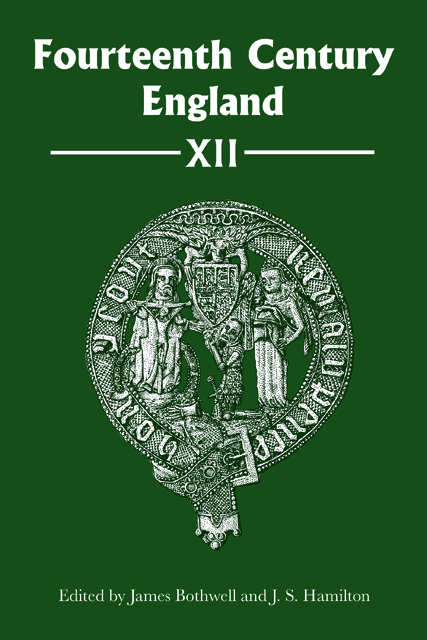Book contents
- Frontmatter
- Contents
- List of Illustrations
- List of Contributors
- Preface
- Abbreviations
- The King’s Confessors and the Royal Conscience in Late Medieval England
- ‘Such maintenance as …’: Corrodies of the Crown
- ‘Vos maisons sount pris al eops le counte’: Walter Bedwyn, Treasurer of York, and the Return of Piers Gaveston
- The Deposition of Edward II: The Kenilworth Embassies
- The English Parliament and the Trial of the ‘Peers of the Land’ in Henry of Lancaster’s Revolt (1328–29): The Origins of a Privilege
- A Brotherhood Uncovered: Investigating the Knightly Following of Thomas Beauchamp, earl of Warwick, 1329–69
- The Black Death and Clerical Prospects in England
- The Last of the Duketti? Richard II, Henry of Monmouth and the House of Lancaster
- Confusion Confounded? The Contrasting Military Fortunes of Sir William Neville (d. c.1391) and Sir William Neville of Pickhill and Rolleston (d. c.1420)
The Deposition of Edward II: The Kenilworth Embassies
Published online by Cambridge University Press: 11 January 2023
- Frontmatter
- Contents
- List of Illustrations
- List of Contributors
- Preface
- Abbreviations
- The King’s Confessors and the Royal Conscience in Late Medieval England
- ‘Such maintenance as …’: Corrodies of the Crown
- ‘Vos maisons sount pris al eops le counte’: Walter Bedwyn, Treasurer of York, and the Return of Piers Gaveston
- The Deposition of Edward II: The Kenilworth Embassies
- The English Parliament and the Trial of the ‘Peers of the Land’ in Henry of Lancaster’s Revolt (1328–29): The Origins of a Privilege
- A Brotherhood Uncovered: Investigating the Knightly Following of Thomas Beauchamp, earl of Warwick, 1329–69
- The Black Death and Clerical Prospects in England
- The Last of the Duketti? Richard II, Henry of Monmouth and the House of Lancaster
- Confusion Confounded? The Contrasting Military Fortunes of Sir William Neville (d. c.1391) and Sir William Neville of Pickhill and Rolleston (d. c.1420)
Summary
The deposition of Edward II was a seminal event in the history of later medieval England. In the memorable words of May McKisack, it was ‘the great divide in our later medieval history, the greatest since 1066’. Yet it is also an event which has proved notoriously difficult to unravel, since the chronicle narratives which describe proceedings are partial, contradictory and ultimately defy full reconciliation. A hitherto neglected document – although it has been published for 300 years in Thomas Rymer’s Foedera, and has been available in calendared form in the Calendar of Close Rolls for over a century – sheds much new light on Edward’s deposition, not only on the course of events, but also potentially on Edward’s response to them and the sources upon which we found our accounts. Dated 9 February 1327, it is an order by the new king, Edward III, to the treasurer and barons of the exchequer to cancel two recognizances imposed by his father on John Stratford, bishop of Winchester, in 1324 (‘the Order’). The first of these was for £10,000, and entered into by Stratford to secure the release of his temporalities, while the second was for £2,460 5s. 10d., and made for the release of corn growing in his bishopric and ‘divers other things’. This essay aims to analyse the Order at length for the first time, and to explore its significance for our understanding of Edward II’s downfall.
Despite the difficulties with the chronicle sources, research – and particularly the work of Claire Valente, Michael Prestwich and Seymour Phillips – has now established the broad picture of what happened in January 1327 to bring about Edward’s removal. In outline, following a successful invasion by Isabella (the queen) and Mortimer (her political ally and possible lover), Edward was captured, incarcerated and stripped of the government of the realm. Two bishops were dispatched to the imprisoned king at Kenilworth castle, to invite him to come to Westminster, where a parliament had assembled on 7 January. His refusal to attend was announced by the bishops, who returned to the parliament on 12 January. That evening, there was a meeting of prelates and magnates, where it was agreed that Edward II should be replaced by his son, and articles of accusation were drawn up.
- Type
- Chapter
- Information
- Fourteenth Century England XII , pp. 65 - 78Publisher: Boydell & BrewerPrint publication year: 2022



